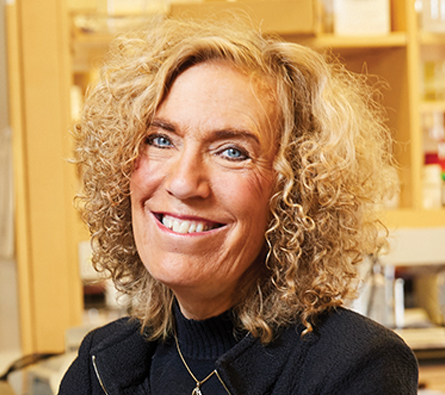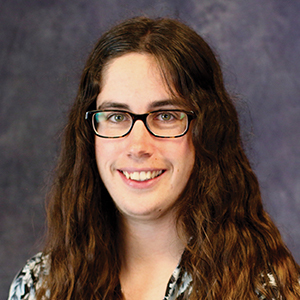Fuchs goes boldly where no stem cell biologist has gone before
Elaine Fuchs began her career with an act of rebellion, submitting a three-page essay on the inadequacies of the GRE in lieu of test results with her graduate school applications. Such breaks with tradition would come to define her approach to science.

Fuchs, a professor of mammalian cell biology and development at the Rockefeller University, has won the 2022 Bert and Natalie Vallee Award in Biomedical Science for her foundational research showing how stem cells create, maintain and repair our skin.
“I began my career in biochemistry and slowly migrated into stem cell research and cancer, so for me to receive this award from the ASBMB is really special,” Fuchs said. “I look forward to being at the annual meeting and talking about the work that we have been doing over four decades.”
In her nominating letter, Helen Blau, a professor at Stanford University School of Medicine, wrote, “Innovation is a hallmark of Fuchs’ work. She has repeatedly exploited a diversity of approaches to probe old questions in new ways.”
A desire to impact human health motivated Fuchs’ career transitions: from physical chemistry as an undergraduate to the biochemistry of bacterial sporulation as a Ph.D. student to skin cell biology as a postdoc and in her own lab. Each transition required a leap into the scientific unknown.
“You can never solve an equation about life,” Fuchs said. “It took me much of my career to realize that that’s what I enjoy most about biology. There are always new questions that emerge from each experiment.”
Although Fuchs no longer works at the bench, she is as passionate about her research as when she started her lab 40 years ago. She continues to inspire junior researchers to become fearless in their approach to science.
Exploring the secrets of skin disease
As an assistant professor, Fuchs used the nascent recombinant DNA technology to hunt for genes behind human skin disorders. Her lab focused on keratins, the major structural proteins in skin cells, identifying mutations that disrupt keratin assembly and the skin’s unique protective qualities.
By engineering transgenic mice with keratin mutations and comparing their pathologies with images in dermatology textbooks — an unconventional approach in the early 1990s — Fuchs and her lab discovered the mutations underlying several human skin disorders. These landmark studies unlocked a new paradigm of studying mutated proteins in mice to define the genetic bases of human disease.
Fuchs’ lab then explored how stem cells create, remodel and repair the epithelial barrier at the skin surface and how these processes go awry in cancer. Her team aims to find drugs that target cancerous epithelial stem cells with minimal harm to normal stem cells, leading to more effective and safer treatments.
Most recently,Fuchs’ lab discovered an epigenetic memory recorded within the chromatin of tissue stem cells after stress. It provides new insights into chronic disorders like psoriasis, atopic dermatitis, asthma and inflammatory bowel disease. In her nominating letter, Mina Bissel of the Lawrence Berkeley National Laboratory wrote, “Fuchs’ team continues to develop and adapt new tools and technology to tackle big questions in stem cell biology.”
2022 ASBMB award winners
Lea Michel, ASBMB Early Career Leadership Award
Marlene Belfort, ASBMB Mid-Career Leadership Award
Michael Airola, Walter A. Shaw Young Investigator Award in Lipid Research
Alex Toker, Avanti Award in Lipids
Tatyana Sharpee, Delano Award for Computational Biosciences
Tracy Johnson, Ruth Kisrchstein Diversity in Science Award
Martin Bollinger, William C. Rose Award
Joe Provost, ASBMB Award for Exemplary Contributions to Education
Walther and Robert Farese Jr., ASBMB–Merck Award
Greg Wang, ASBMB Young Investigator Award
Janet Smith, Mildred Cohn Award
Kathleen Collins, Earl and Thressa Stadtman Distinguished Scientist Award
Susan Taylor, Herbert Tabor Research Award
John Boothroyd, Alice and C.C. Wang Award in Molecular Parasitology
Enjoy reading ASBMB Today?
Become a member to receive the print edition four times a year and the digital edition monthly.
Learn moreGet the latest from ASBMB Today
Enter your email address, and we’ll send you a weekly email with recent articles, interviews and more.
Latest in People
People highlights or most popular articles

Building a career in nutrition across continents
Driven by past women in science, Kazi Sarjana Safain left Bangladesh and pursued a scientific career in the U.S.

Kiessling wins glycobiology award
She was honored by the Society for Glycobiology for her work on protein–glycan interactions.

2026 ASBMB election results
Meet the new Council members and Nominating Committee member.

Simcox wins SACNAS mentorship award
She was recognized for her sustained excellence in mentorship and was honored at SACNAS’ 2025 National Conference.

From humble beginnings to unlocking lysosomal secrets
Monther Abu–Remaileh will receive the ASBMB’s 2026 Walter A. Shaw Young Investigator Award in Lipid Research at the ASBMB Annual Meeting, March 7-10 in Washington, D.C.

Chemistry meets biology to thwart parasites
Margaret Phillips will receive the Alice and C. C. Wang Award in Molecular Parasitology at the ASBMB Annual Meeting, March 7-10 in Washington, D.C.

